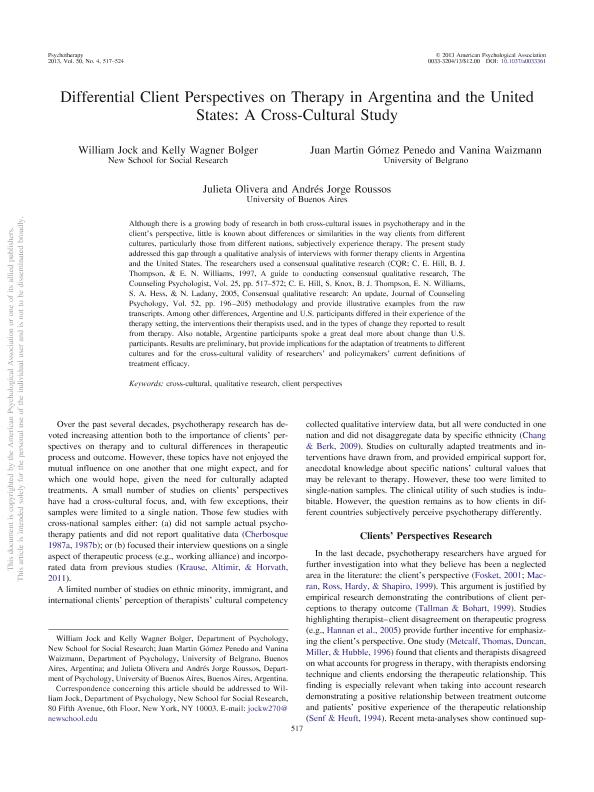Mostrar el registro sencillo del ítem
dc.contributor.author
Jock, William
dc.contributor.author
Wagner Bolger, Kelly
dc.contributor.author
Gómez Penedo, Juan Martín

dc.contributor.author
Waizmann, Vanina

dc.contributor.author
Olivera Ryberg, Julieta María

dc.contributor.author
Roussos, Andres Jorge

dc.date.available
2017-11-17T17:39:19Z
dc.date.issued
2013-12
dc.identifier.citation
Jock, William; Wagner Bolger, Kelly; Gómez Penedo, Juan Martín; Waizmann, Vanina; Olivera Ryberg, Julieta María; et al.; Differential Client Perspectives on Therapy in Argentina and the United States: A Cross-Cultural Study; American Psychological Association; Psychotherapy; 50; 4; 12-2013; 517-524
dc.identifier.issn
0033-3204
dc.identifier.uri
http://hdl.handle.net/11336/28437
dc.description.abstract
Although there is a growing body of research in both cross-cultural issues in psychotherapy and in the client’s perspective, little is known about differences or similarities in the way clients from different cultures, particularly those from different nations, subjectively experience therapy. The present study addressed this gap through a qualitative analysis of interviews with former therapy clients in Argentina and the United States. The researchers used a consensual qualitative research (CQR; C. E. Hill, B. J. Thompson, & E. N. Williams, 1997, A guide to conducting consensual qualitative research, The Counseling Psychologist, Vol. 25, pp. 517–572; C. E. Hill, S. Knox, B. J. Thompson, E. N. Williams, S. A. Hess, & N. Ladany, 2005, Consensual qualitative research: An update, Journal of Counseling Psychology, Vol. 52, pp. 196–205) methodology and provide illustrative examples from the raw transcripts. Among other differences, Argentine and U.S. participants differed in their experience of the therapy setting, the interventions their therapists used, and in the types of change they reported to result from therapy. Also notable, Argentine participants spoke a great deal more about change than U.S. participants. Results are preliminary, but provide implications for the adaptation of treatments to different cultures and for the cross-cultural validity of researchers’ and policymakers’ current definitions of treatment efficacy.
dc.format
application/pdf
dc.language.iso
eng
dc.publisher
American Psychological Association

dc.rights
info:eu-repo/semantics/openAccess
dc.rights.uri
https://creativecommons.org/licenses/by-nc-sa/2.5/ar/
dc.subject
Cross-Cultural
dc.subject
Qualitative Research
dc.subject
Client Perspectives
dc.subject.classification
Psicología

dc.subject.classification
Psicología

dc.subject.classification
CIENCIAS SOCIALES

dc.title
Differential Client Perspectives on Therapy in Argentina and the United States: A Cross-Cultural Study
dc.type
info:eu-repo/semantics/article
dc.type
info:ar-repo/semantics/artículo
dc.type
info:eu-repo/semantics/publishedVersion
dc.date.updated
2017-11-17T13:45:04Z
dc.journal.volume
50
dc.journal.number
4
dc.journal.pagination
517-524
dc.journal.pais
Estados Unidos

dc.description.fil
Fil: Jock, William. The New School University; Estados Unidos
dc.description.fil
Fil: Wagner Bolger, Kelly. The New School University; Estados Unidos
dc.description.fil
Fil: Gómez Penedo, Juan Martín. Universidad de Belgrano; Argentina. Consejo Nacional de Investigaciones Científicas y Técnicas; Argentina
dc.description.fil
Fil: Waizmann, Vanina. Universidad de Belgrano; Argentina. Consejo Nacional de Investigaciones Científicas y Técnicas; Argentina
dc.description.fil
Fil: Olivera Ryberg, Julieta María. Universidad de Buenos Aires; Argentina. Consejo Nacional de Investigaciones Científicas y Técnicas; Argentina
dc.description.fil
Fil: Roussos, Andres Jorge. Universidad de Buenos Aires; Argentina. Consejo Nacional de Investigaciones Científicas y Técnicas; Argentina
dc.journal.title
Psychotherapy
dc.relation.alternativeid
info:eu-repo/semantics/altIdentifier/doi/http://dx.doi.org/10.1037/a0033361
dc.relation.alternativeid
info:eu-repo/semantics/altIdentifier/url/http://psycnet.apa.org/doiLanding?doi=10.1037%2Fa0033361
Archivos asociados
